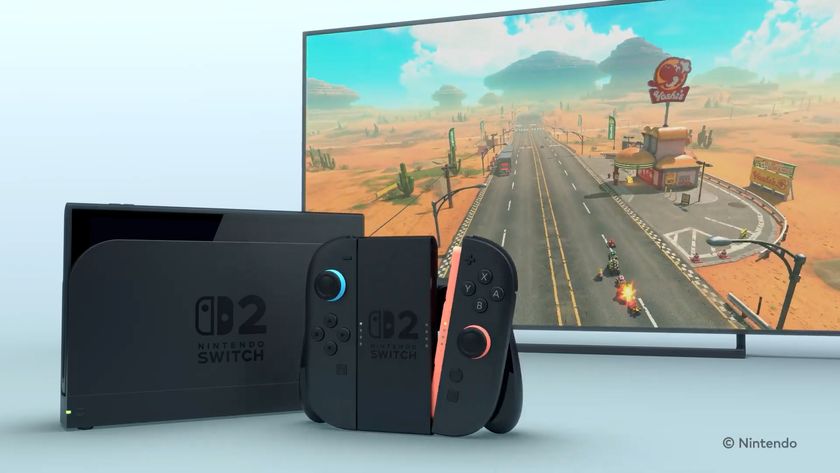High Horse: Save Our Internet
What SOPA is, and what we can do to fight against it

High Horse is a rotating opinion column in which GamesRadar editors and guest writers are invited to express their personal thoughts on games, the people who play them and the industry at large.
By now, chances are you’ve heard some of the uproar surrounding the Stop Online Piracy Act, or SOPA. Introduced to the House of Representatives in October by Representative Lamar Smith (R-TX), it is designed as a countermeasure to Internet piracy.
So, let’s educate ourselves about it, shall we?

Above: SOPA was introduced in the House by Lamar Smith (R-Texas) on October 26, 2011
What is SOPA trying to do?
Piracy is a problem. It’s straight-up wrong. Stealing movies, games, music, whatever; it’s all wrong. Oh, you have a counter-argument? Sorry, nope. Piracy is bad. It hurts artists, plain and simple.
SOPA is the House’s proposed solution to the piracy problem. Its goal is to put power into the hands of owners of intellectual properties so that they can better police how their product is being distributed. In a lot of ways, its goal is a noble one. It’s looking to protect those who create a work and are essentially being stolen from.
However, SOPA is certainly far from the correct solution. Heck, in my eyes, it’s perhaps the most harmful thing to possibly happen to the Internet since its inception.
Sign up to the 12DOVE Newsletter
Weekly digests, tales from the communities you love, and more
What exactly would SOPA look like in practice?
Upon passing, SOPA would give owners of intellectual property (or the US Department of Justice) the ability to seek court orders against websites that they believe are infringing upon their copyrights. Whether those sites are actively enabling infringement or are simply allowing it to happen doesn’t matter. If your site is perceived as promoting any sort of copyright infringement, it can be shut down without notification. Pretty frightening.
To make matters worse, it also allows the property rights holders to legally demand all revenue to an offending site be stopped, regardless of where it’s coming from. That means no revenue from ads, donations, or even payments coming from online payment services like PayPal or Google Checkout. Essentially, SOPA gives IP holders the unchecked power to shut down a site for an undisclosed amount of time.
Finally, it would require search engines to remove the listings of websites that have been shut down. In effect, for as long as a website is banned, it no longer exists.

Who will this affect?
Everyone that owns a website. From the smallest blogs to YouTube to, let’s just say, GamesRadar, anyone that relies on copyrighted material to run their site could face scrutiny. Theoretically, SOPA could even affect sites that allow comments on their content. If someone were to link to illegal materials on a website, that site could be nailed for enabling piracy. The definition of how websites enable piracy is so broad that it would make websites unreasonably responsible for their user-generated content.
With the possibility of losing all ad revenue and traffic from search engines, the risk of launching a new startup is much higher. From a pure business perspective, SOPA could cripple one of the fastest-growing industries in the country, and one that is creating huge numbers of jobs.
Who supports it?
Well, a lot of groups. Most notable for the gaming community is the ESA, a collection of publishers that includes Microsoft, Nintendo, Sony, EA, Ubisoft, Capcom, Sega, Epic and a slew of others.
Outside of the gaming industry, the biggest supporters tend to be those with high stakes in their copyrighted material, such as the RIAA or MPAA. Domain registrar GoDaddy originally supported the bill, but after boycotts led by Reddit – which resulted in huge losses for the company, including the removal of Wikipedia and its subsidiaries from GoDaddy’s servers – the company has withdrawn its support.

Who’s against it?
Pretty much anyone who relies on user-generated content, most notably Google, which owns Youtube. Also against the bill are the Wikimedia foundation, Facebook, Yahoo!, Twitter, Tumblr, Yahoo! and the EFF.
Some good news
See those names up there? They represent a huge amount of money in the growing industry called The Internet. If the bill passes – which it seems poised to do at the time of this writing – we can expect a huge amount of resistance to come from those names. At the very least, the bill will face a huge legal battle, if not outright dismissal through our country’s wonderful legal system. There’s a whole lot of money on each side of the issue, so it’s going to be interesting to watch.
What can we do?
Write to your congressperson. Call them. Sign the petition. Vote with your money by resisting the urge to give money to those who support SOPA. Attend the American Censorship Day protests. Above all, educate yourself about what’s going on in Congress right now. SOPA is a landmark bill that could completely change the way we use the Internet for the worse. Let’s fight it.
Taylor Cocke is a Los Angeles-based writer and producer who spends too much time watching numbers go up in MMOs and ARPGs. You name it, he's written and/or produced for them, which is shocking considering the aforementioned MMO playing.

"If it can run on Steam Deck, it can probably run on Switch 2": Ex Nintendo marketing leads say Baldur's Gate 3 and Elden Ring prove there's a market for big AAA games on Switch 2

Here are my biggest Nintendo Switch 2 Direct predictions as the rumor mill kicks up questions about the console's price, launch lineup, specs, and more










